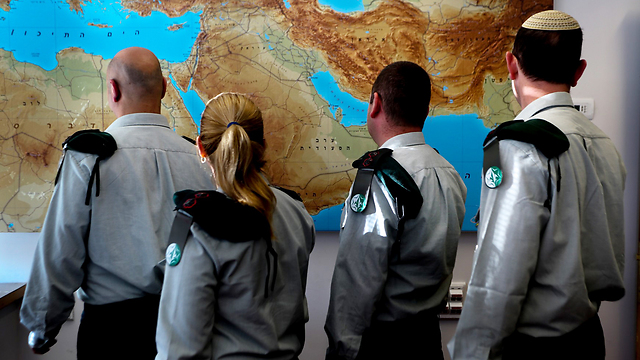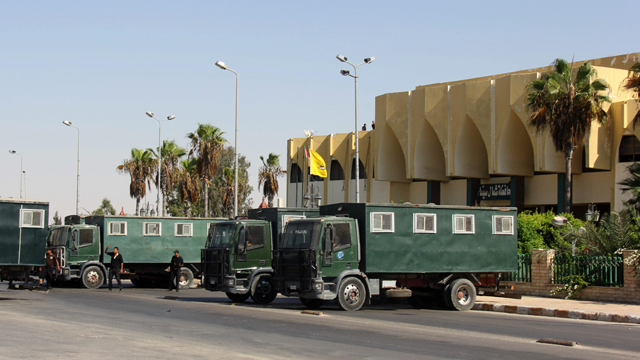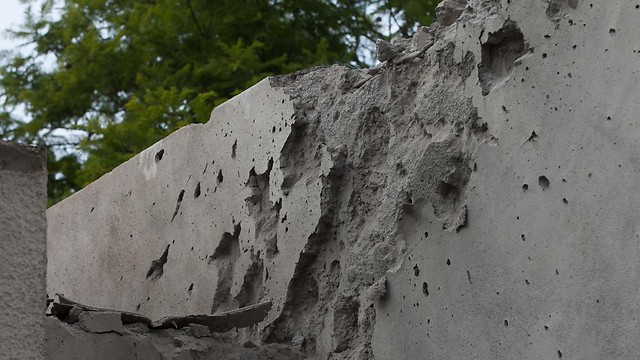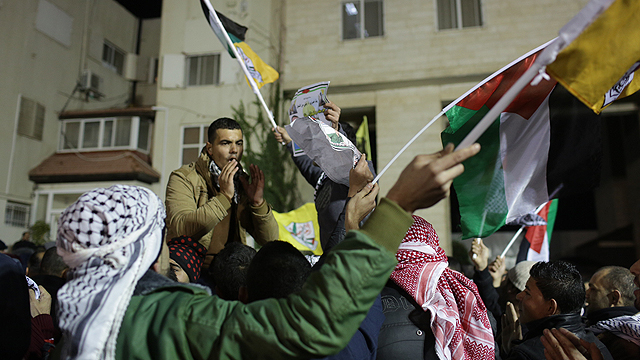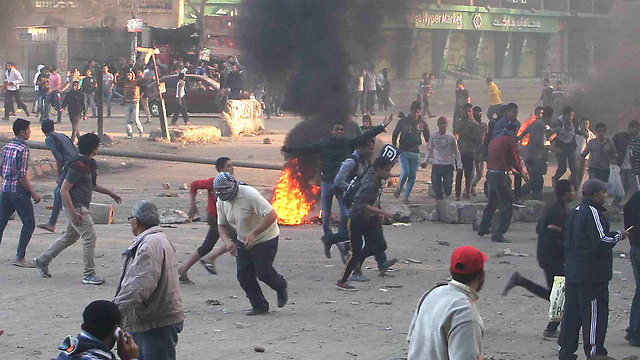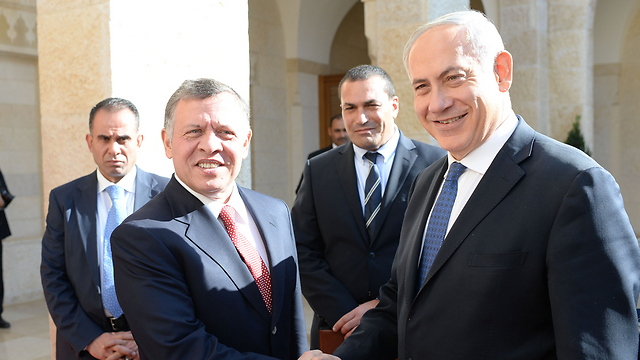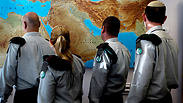

They, the heads of each "theater" in Israel's Military Intelligence Research and Analysis Division, lead the centers for up-to-date knowledge, insight, evaluation, and action objectives (targets) that make up the Military Intelligence.
Each one heads their own "theater", according to his or her area of expertise, and command dozens of men and women - from privates to lieutenant colonels, each also specializing in a specific field or issue.
I jumped at the opportunity to interview them, hoping they might agree to share snippets of their knowledge and I wasn't disappointed.
The Military Intelligence floor in the Kirya (the IDF headquarters in Tel Aviv) was full of security personnel, but the four theater commanders spoke with relative openess about the Middle East and their expectations for the future.
The Four
Dudi: I'm head of the "Regional Theater", a new theater established about two years ago as a result of research into on going turmoil in the Arab world. The aim was to create an overview of what's happening in terms of regional strategy. This includes social and economic aspects, and specifically the phenomenon of Global Jihad.
Roi: I'm director of the "Lebanon Theater". It used to be called the "Terror Theater", but over the last few years we've been focusing on the growing strength of Hezbollah and the country of Lebanon.
Hezbollah isn't actually a state organization, but in effect it has its own state. You refer to the terrorist organization and the country as a single whole, I remark, and he agrees. Later in the conversation, he has to leave to take care of an urgent matter.
Revital: I'm director of the "Egypt and Jordan Theater", basically the Arab states with political ties with Israel. This theater is still called the "Southern Theater", although in the past we used to deal with issues that have now been handed over to the "Regional Theater". We engage with many aspects of state politics; peace as a strategic asset for Israel, but for Egypt and Jordan as well. We need to see how we can support this issue and our dialogue with these countries.
The military aspect (monitoring Egypt and Jordan's armies as well as any threat they may pose) isn't really relevant at this moment, but does require a certain amount of attention. The third issue is terror, specifically in the Sinai.
Michael: I'm director of the "Palestinian Theater". Soon I will have been a part of this saga for seven years. These have been years of studies of the West Bank, of Gaza, of the political domain and the military domain. When I try to explain what I do, I talk about how in the morning I deal with the question, 'Where is Abbas?' In the afternoon we discuss the question whether there will or won't be a new intifada, and in the evening I have to handle warnings and intelligence regarding military action in Gaza.
I understand that you and the theaters that you each head are actually the main contractors and producers for Israel's Military Intelligence. You bring together all the raw material provided by agents out in the field, including Mossad, Shin Bet, the Foreign Ministry and other sources. Your consumers include everyone from the prime minister and defense minister to a soldier from the Givati Brigade laying in ambush on the Gaza border, or the Shayetet 13 commandos climbing aboard the deck of the "Klos C".
Roi: We deal with the entire spectrum of the intelligence world, from strategy to specific tactics, classic military research and government policy research. Through target research and intelligence, our work allows decisions to be made and ultimately allows for the running of Intelligence operations.
Now that we've confirmed who we're dealing with, I'll ask each of you the same question. What was the most significant development in your individual theaters in the past year, and what will keep you most busy in the coming year?
Michael - the Palestinians
The main event last year was Operation Pillar of Defense. After that, Israel entered a new and different strategic phase. The Gaza truce set a precedent that will last for at least another year and a half.
I'm not sure that residents of the south would agree with you, since rocket attacks continued after the operation.
Not only did the attacks decrease dramatically, I'm also looking at how my primary enemy, Hamas, behaves. Today the organization is acting very differently to how it was characterized before November 2012 (when the operation took place). Now Hamas has a more robust grounding in governance and responsibility, and this affects their conduct toward Israel.
In contrast, since Operation Pillar of Defense there has also been a dramatic attempt to bolster strength in Gaza. At the moment there is a sharp increase of Hamas' local production and stockpiling of medium-range rockets (M75) and those similar to what Islamic Jihad produces. These rockets can reach north of the Dan Region in central Israel. The enemy has learned that this is a very powerful tool, and the hype it creates in the media is massive. At this point we are only seeing a few hundred rockets. What this means is that the next confrontation is going to be something that we've never experienced - a dramatic event.
In the West Bank, the main question that I've been dealing with in the last year and a half is how this arena can continue to be stable despite the stagnation of the political process and other issues that provoke unrest there. I believe that there is a connection between two main things. One is the Palestinian leadership, which believes very strongly in adherence to sovereignty and in preservation of the state, and will therefore prevent a return to what we experienced in the past (namely, intifada and terrorism - RBY).
The second thing is critical, and a huge focus for Military Intelligence - the (Palestinian) public. Civilians are still in a situation of a collective, traumatic memory of hard times from the period of the Second Intifada; from Israeli tanks and armed men marching through the markets with guns. The current generation doesn't want to go back to that. And a point that is no less important - the economy of the West Bank is relatively stable.
But when I look forward I try to see what will happen in the moment that there is a change in the politic dimension (if the peace talks disintegrate completely - RBY). There is considerable potential for serious eruptions.
Do you think that they'll recognize the political change?
We really try to diversify our sensors, but I live in the Middle East and I always remember Mohamed Bouazizi (the Tunisian street vendor who set himself on fire to protest against the government and brought the Arab Spring or "The Turbulence" in Military Intelligence language, to boiling point). We need to be ready for something that will come from nowhere and without warning, which will ignite a massive fire.
Some argue that without the Shin Bet's nightly raids and arrests in the West Bank, the IDF wouldn't be capable of providing a sufficient level of security for the residents of the State of Israel and the West Bank.
The contribution of the Shin Bet is of course of high quality and utmost importance. But we also need to pay attention to revolution in the West Bank, especially since 2007, after the complete shock from Hamas' takeover in Gaza. I'm from the generation that is familiar with the leaders in the days of Arafat, and I know the current leaders. The current generation is smarter than the previous generation in every aspect. Because these are people with a different perspective, in my opinion a lot less political, and with a much higher level of action. This gives us a kind of optimism today about the reality in the West Bank.
Revital - southern arena
The main event last year was the fall of the Muslim Brotherhood government in Egypt and the new political journey on a road map created by General Sisi - elections, democracy. What's going to happen in the future? That's the topic that will keep me busy next year as well: How will the presidential and parliamentary elections be carried out and especially how will the government handle adversity in internal security and the economy? The Muslim Brotherhood regime failed in both these areas and so it fell.
Another issue will be the growth and strengthening of terrorism in Egypt and the Sinai - against Israel and against the Egyptian government. Sinai is a microcosm of what's happening in the entire area, including struggles within the Global Jihad, and between the Iraqi organization ISIL (Islamic State of Iraq and the Levant) and the leadership of al-Qaeda.
More importantly, we suspect that these groups are moving toward a consolidation of Global Jihad under some kind of umbrella organization, "al-Qaeda in the Southern Region" - a framework that would include Egypt, with the possibility of expanding to Gaza.
My understanding is that in the coming year nothing will come of Egypt's fight against terrorism, and we'll know where this is heading. Developments in Syria, fighters (from there) returning home, both to Jordan and to Egypt, have great potential to affect this area. There is definitely a tendency to talk about Sinai, probably because of its link to Israel, but the battle is in Cairo, in the Delta in Egypt. Events there will have an intrinsic impact on the border with Israel.
Regarding the political process in Egypt, I think that the elections will go ahead. It could be that there will be a few - let's call them obstacles - in the way, or changes in timetables, but the main question is what will happen in Egypt six months or a year afterwards.
Will Sisi meet the Egyptian people's expectations of improvements in personal security and the economic situation?
Yes. This leader has somewhere in the region of 87 million mouths to feed. In the time it takes us to finish a sentence - 16 seconds - a baby is born in Egypt, with all that intails. How will he be raised, how will he be educated, welfare system, medicine, how will he find his place in the work force? The revolution against Mubarak didn't start because of religious ideology, but instead because of economic and social issues. In this respect, aid from the outside could prove to be critical.
Haven't Saudia Arabia and the other Gulf States already promised billions to Sisi?
Yes, political and economic support from outside is very important to stabilizing Egypt. Furthermore, the government bureaucracy is stable and is holding on. In my opinion, that's the reason that Egypt didn't fall apart as a result of the regional upheaval as other countries did. I also think that this is what will cause this ship to keep on slowly sailing the Nile. It will hit a few bumps, but it will stay afloat. That's why I define what's happening in Egypt as "controlled instability".
Another big question mark is what the Muslim Brotherhood will do and what will happen to the movement. Whether there will be an attempt to radicalize opposition to the government, or the extremists will be told to keep their heads down for the time being, as they did in the past, and in the meantime focus on the social "dawah" (missionary work).
Against this background, the high expectations of Sisi and possible extremism from the Muslim Brotherhood, we are waiting to see another twist in Egypt in the summer of next year.
I understand that stability is being maintained in Jordan.
The thing that threatens stability in Jordan is what's happening in the northern arena - the civil war in Syria spilled over into Lebanon and hundreds of thousands of refugees have been forced to flee to Jordan, and violent chaos in Iraq. And here we can see the possibility jihad enveloping Jordan and seeping into the country.
Are there leaks of Global Jihad from Sinai entering southern Jordan?
For a long time. We've been discussing this possibility since the completion of the fence along the border with Sinai. Both intelligence-wise and operationally we are preparing for this.
If we're already discussing intelligence preparations - there's a lot of talk of revolution in Military Intelligence in the last three years.
Since Pillar of Defense, we've come a long way in quality and quantity of targets that we define, also in terms of preventing "collateral damage". We work very hard so that those who "aren't involved" don't get hurt, and that makes the intelligence work much more complex, cumbersome and challenging. In most situations, this brings down our targets (rules out an attack). It's a key element in decision-making during operations.
There's another problem: human capacity has difficulty dealing with such masses of information, even when you have it all laid out on the table. That's why today we need to develop the tools to allow us to deal with an explosion of information in an effective and relevant manner.
One additional component in the changes we've undertaken can be seen in my theater in the way we define the mission. My job is less to prepare for the next war and more to keep the peace. Sometimes it's a much more complex job than waging war. When there are challenges, you have to know how to deal with them in a smart way, to analyze the risk and identify the main points of friction.
Read part two of this feature article - and hear from the heads of the Lebanon and regional "theaters" next week.














